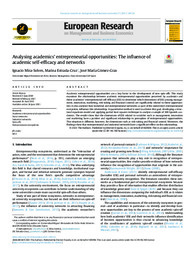Por favor, use este identificador para citar o enlazar este ítem:
https://hdl.handle.net/11000/34355Registro completo de metadatos
| Campo DC | Valor | Lengua/Idioma |
|---|---|---|
| dc.contributor.author | Mira-Solves, Ignacio | - |
| dc.contributor.author | ESTRADA DE LA CRUZ, MARINA | - |
| dc.contributor.author | GOMEZ GRAS, JOSE MARIA | - |
| dc.contributor.other | Departamentos de la UMH::Estudios Económicos y Financieros | es_ES |
| dc.date.accessioned | 2025-01-11T14:43:14Z | - |
| dc.date.available | 2025-01-11T14:43:14Z | - |
| dc.date.created | 2021 | - |
| dc.identifier.citation | European Research on Management and Business Economics | es_ES |
| dc.identifier.issn | 2444-8842 | - |
| dc.identifier.issn | 2444-8834 | - |
| dc.identifier.uri | https://hdl.handle.net/11000/34355 | - |
| dc.description.abstract | Academic entrepreneurial opportunities are a key factor in the development of new spin-offs. This study examines the relationship between academic entrepreneurial opportunities perceived by academics and these academics’ entrepreneurial self-efficacy (ESE) to determine which dimensions of ESE (among manage ment, innovation, marketing, risk-taking and financial control) are significantly related to these opportuni ties. It also analyses how industrial and entrepreneurial networks, as part of the university’s entrepreneurial ecosystem, influence this relationship. A quantitative method is used to achieve this goal, developing a struc tural equations model and applying partial least squares technique to analyse a sample of 388 Spanish aca demics. The results show that the dimensions of ESE related to variables such as management, innovation and marketing have a positive and significant relationship to perception of entrepreneurial opportunities. This situation is different, however, for dimensions such as risk-taking and financial control. Moreover, the findings show that entrepreneurial and industrial networks have a significant effect on this relationship. | es_ES |
| dc.format | application/pdf | es_ES |
| dc.format.extent | 11 | es_ES |
| dc.language.iso | eng | es_ES |
| dc.publisher | Elsevier | es_ES |
| dc.relation.ispartofseries | 27 | es_ES |
| dc.relation.ispartofseries | 2 | es_ES |
| dc.rights | info:eu-repo/semantics/openAccess | es_ES |
| dc.rights | Attribution-NonCommercial-NoDerivatives 4.0 Internacional | * |
| dc.rights.uri | http://creativecommons.org/licenses/by-nc-nd/4.0/ | * |
| dc.subject | Academic entrepreneurial opportunities | es_ES |
| dc.subject | Social networks | es_ES |
| dc.subject | Industrial networks | es_ES |
| dc.subject | Spin-offs | es_ES |
| dc.subject | Entrepreneurial ecosystems | es_ES |
| dc.subject.other | CDU::3 - Ciencias sociales::33 - Economía | es_ES |
| dc.title | Analysing academics’ entrepreneurial opportunities: The influence of academic self-efficacy and networks | es_ES |
| dc.type | info:eu-repo/semantics/article | es_ES |
| dc.relation.publisherversion | https://doi.org/10.1016/j.iedeen.2021.100152 | es_ES |

Ver/Abrir:
2021- ERMBE _ Analysing academics entrepreneurial opportunities.pdf
802,2 kB
Adobe PDF
Compartir:
 La licencia se describe como: Atribución-NonComercial-NoDerivada 4.0 Internacional.
La licencia se describe como: Atribución-NonComercial-NoDerivada 4.0 Internacional.
.png)